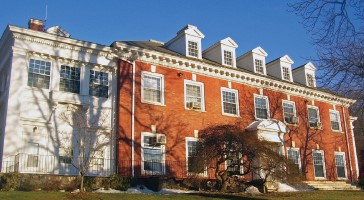
Maria Montessori was born in Italy on August 31, 1870. Growing up, she was heavily influenced by her mother, who was both highly educated and an avid reader. This might be why Maria refused to compromise when it came to her own education. At first she wanted to study engineering, a controversial choice given the social conventions of her time. Then she switched to medicine, which was even more contentious to those misguided people who believed a woman's place was in the home. Ultimately, Maria's hard work paid off when she became the first woman ever to be admitted into the University of Rome's Faculty of Medicine. That Maria Montessori was an intelligent, brave, and capable woman is undeniable. But these admirable traits are not exclusively why she is still remembered today. It is the field of education where her greatest legacy resides. Later in life, Maria began to work with children, and she established her first Casa dei Bambini, or "children's house," in 1907. Maria was convinced that, given a suitable environment, children would take the lead in their own education. In other words, they would start learning themselves not because they were told to, but rather because they wanted to. To Maria, the real challenge was figuring out the right educational environment. Maria's theories are popular to this day, and many schools around the world offer a Montessori education. These schools attempt to cater to certain elements of human psychology, such as communication, work, order, and abstraction. In doing so, their aim is to allow students to build up their own conceptions and self-motivate, instead of being told they're wrong by a figure of authority. When it comes to the actual teaching, Montessori schools use an approach that includes all five of the senses, not just listening and watching. Advocates maintain that the Montessori approach prepares students to conquer the challenges of adult life, whether emotional, academic, or professional. There are also several examples of highly successful people who received a Montessori education, including Jeff Bezos, the founder of Amazon.com. However, if Maria Montessori were still around today, she would likely emphasize that her system is based on developing a lifelong love of learning, not a massive bank account.
1870年8月31日,瑪麗亞• 蒙特梭利誕生於義大利。瑪麗亞的母親受過高等教育,熱衷閱讀,對其成長過程影響深遠。這或許是為何在涉及到自己的教育問題時,瑪麗亞會拒絕妥協。起初,她想讀工程學,這在當時社會是頗有爭議的選擇。而後,她轉讀醫學,這對那群誤以為女人就該待在家裡的人眼中,更具爭議。最後,瑪麗亞的努力沒有白費,她成為有史以來第一位就讀羅馬大學醫學院的女性。 無可否認的是,瑪麗亞• 蒙特梭利是位聰慧、勇敢又能幹的女性。但是,這些令人欽佩的特質並不是她讓人懷念至今的唯一原因,教育領域才是她留給世人最偉大的遺產。 瑪麗亞之後的人生開始從事與孩童有關的工作, 她於1907年成立第一個「Casa deiBambini」,即「兒童之家」。她深信,只要給孩子一個適合的環境,孩子就會在自己的教育之路上引領向前。換句話說,他們會開始自主學習,並不是因為有人要他們這麼做,而是因為他們自己想這麼做。在她眼中,真正的挑戰在於如何提供合適的教育環境。 瑪麗亞的教育理論直到現在仍廣受歡迎,世界各地的學校實施「蒙特梭利教育」。這些學校試圖考慮人類心理的某些要素,例如溝通、工作、秩序、抽象等。他們的目的是讓學生建立自己的觀念並自我激勵,而不是由權威人物來告訴學生他們做錯事情。說到實際的教學,實施蒙特梭利教育體系的學校所採取的教學法運用到五種感官,而不是只是聽跟看而已。 蒙特梭利教育理念的倡導者認為,其教學法能培養學生克服成人生活會面臨的挑戰,不論是在情感上、學術上,還是職業上。也有好幾個曾受過蒙特梭利教育,後來功成名就的例子,比如亞馬遜(Amazon.com)的創辦人傑夫• 貝索斯。但是,如果瑪麗亞• 蒙特梭利現在還在世的話,她很有可能會強調她的教育體系是培養終生對學習的熱愛,而不是為了擁有銀行帳戶的鉅款。 |
沒有留言:
張貼留言